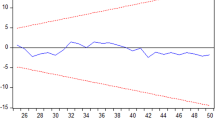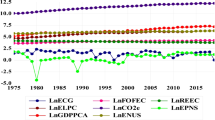Fossil fuel is a key factor related to national energy security. Studying and judging the development trend of China’s future demand for fossil fuel and obtaining fossil fuel stably and adequately is of great significance to ensuring China’s political stability, normal operation of the national economy and national military security. Under the background of low carbon emissions in China, starting from the perspective of energy security, based on China’s carbon emissions and GDP data from 1997 to 2019, four methods, namely Ridge Regression, ARIMA Time Series Model, BP Neural Network and Linear Regression, are used to forecast and analyze the demand for six fossil fuels: raw coal, coke, crude oil, kerosene, diesel and natural gas, providing a reference for national energy policy formulation and fossil fuel security early warning.
Similar content being viewed by others
References
Yzanrong Huang, Min Chen. Key Technology Difficulties of Crowdsourcing in Petrochemical Industry, Chemistry and Technology of Fuels and Oils, 2019,55(5): 635-642.
Xunzhang Pan, Lining Wang, Jiaquan Dai, et al. Analysis of China’s oil and gas consumption under different scenarios toward 2050: An integrated modeling, Energy, 2020, 195, 1-10.
Meng Yuan, Haoran Zhang, Bohong Wang, et al. Downstream oil supply security in China: Policy implications from quantifying the impact of oil import disruption[J]. Energy Policy, 2020, 136, 1-17.
Yanrong Huang, Dan Han. Analysis of China’s Oil Trade Pattern and Structural Security Assessment from 2017 to 2021, Chemistry and Technology of Fuels and Oils, 2022, 58(1), 146-156.
Yuli Shan, Dabo Guan, Heran Zheng, et al. Data Descriptor: China CO2 emission accounts 1997–2015, Scientific Data, 2018, 5, 1-14.
Lv Tao, Guo Qing. Study on the evolutionary mechanism of sudden oil shortage and emergency recovery, Resource Development and Market, 2016, 32 (06): 684-689.
The State Council. Opinions on the complete, accurate and comprehensive implementation of the new development concept to do a good job in carbon peaking and carbon neutralization, Beijing, 2021-10-24, http://www.gov.cn/zhengce/2021-10/24/content_5644613.htm.
Alkhathlan, Khalid, Javid, Muhammad. Carbon emissions and oil consumption in Saudi Arabia, Renewable and Sustainable Energy Reviews, 2015, 48: 105-111.
Waheed, Rida, Sarwar, Sahar, Wei, Chen. The survey of economic growth, energy consumption and carbon emission, Energy Reports, 2019, 5: 1103-1115.
Weng, Zhixiong, Song, Yuqi, Ma, Hao et al. Forecasting energy demand, structure, and CO2 emission: a case study of Beijing, China, Environment, Development and Sustainability, 2022, 1-23.
Yanrong Huang, Shuaihao Li, Rui Wang, et al. Forecasting Oil Demand with the Development of Comprehensive Tourism, Chemistry and Technology of Fuels and Oils, 2021, 57(2), 299-310.
Yu L, Zhao Y Q, Tang L, et al. Online big data-driven oil consumption forecasting with Google trends, International Journal of Forecasting, 2018.
Chen R, Rao Z H, Liu J X, et al. Prediction of energy demand and policy analysis of Changsha based on LEAP model, Resources Science, 2017, 39(3): 482-489.
Zheng M G, Li Q. Scenario Forecast of China’s Oil Resource Demand from 2020 to 2030, Progress in Earth Science, 2020, 35 (03): 286-296.
Jian Chai, Ting Liang, Youhong Zhou, et al. Analysis of oil consumption under different regional industrialization levels: an empirical study based on Path STR model, China Management Science, 2017, 25 (11): 47-57.
Xiaojun Xie, Yunlan Qiu, Ling Shi. Energy consumption prediction based on ARIMA and BP neural network combination model, Mathematics Practice and Cognition, 2019, 49 (10): 292-298.
Huanhuan Fang, Hongbo Ji, Shuxin Tian. Prediction of power energy demand based on grey linear regression weighted fuzzy Markov chain model, Electronics, 2020,43 (05): 997-1003.
Liu G W, Yan Q, Yang J B. World oil demand based on S-Curve Model of the transport sector, Resources Science, 2018, 40(3), 547-557.
Li J R, Wang R, Wang J Z, et al. Analysis and forecasting of the oil consumption in China based on combination models optimized by artificial intelligence algorithms, Energy, 2018, 144: 243-264.
Bingzhou Wen, Ruixia Suo. Forecast of China’s Energy Demand Based on Combination Model, Mathematical Practice and Understanding, 2016, 46 (20): 45-53.
Li Z Y, Lu H, Ren W P, et al. China’s oil consumption and its future development trend analysis, Chemical Industry and Engineering Progress, 2016, 35(6):1739-1747.
Lu Zhang, Yongan Li, Chong Wang. Research on the influencing factors of energy consumption based on correlation analysis and regression analysis, China Energy, 2020, 42 (06): 42-47.
Yanrong Huang, Rui Wang, Bin Huang, Bo Wei, Shu Li Zheng, Min Chen. Sentiment Classification of Crowdsourcing Participants’ Reviews Text Based on LDA Topic Model, IEEE Access, 2021, 9(1): 108131 - 108143.
Yanrong Huang, Min Chen. Improve Reputation Evaluation of Crowdsourcing Participants Using Multidimensional Index and Machine Learning Techniques, IEEE Access, 2019, 7(1): 118055-118067.
Rumelhart D E, Hinton G E, Williams R J. Learning representations by back propagating errors[J]. Nature, 1986, 323(6088), 533-536.
Acknowledgments
This work was supported by the National Natural Science Foundation of China under Grant 72101235; Soft Science Project of Zhejiang Provincial Department of Science and Technology under Grant 2023C35012; the State Scholarship Fund under Grant 202108330330; Basic Public Welfare Research Project of Zhejiang Province under Grant LGF22F020020; Zhejiang Higher Education Association under Grant KT2022001; Cultivation Project of Water Conservancy Digital Economy and Sustainable Development Soft Science Research Base under Grant xrj2022018; Scientific Research Foundation of Zhejiang University of Water Resources and Electric Power under Grant xky2022051.
Author information
Authors and Affiliations
Corresponding author
Additional information
Translated from Khimiya i Tekhnologiya Topliv i Masel, No. 6, pp. 123–129 November – December, 2022.
Rights and permissions
Springer Nature or its licensor (e.g. a society or other partner) holds exclusive rights to this article under a publishing agreement with the author(s) or other rightsholder(s); author self-archiving of the accepted manuscript version of this article is solely governed by the terms of such publishing agreement and applicable law.
About this article
Cite this article
Huang, Y., Lin, J., Wang, Y. et al. Forecast of Fossil Fuel Demand Based On Low Carbon Emissions from the Perspective of Energy Security. Chem Technol Fuels Oils 58, 1075–1082 (2023). https://doi.org/10.1007/s10553-023-01490-z
Published:
Issue Date:
DOI: https://doi.org/10.1007/s10553-023-01490-z




